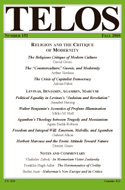From Telos 152 (Fall 2010), Annabel Herzog’s “Political Equality in Levinas’s ‘Judaism and Revolution’.” Read the full version at TELOS Online website.
Abstract
 This article is an interpretation of Levinas’s Talmudic reading “Judaism and Revolution” (1969), whose philosophical aim was to propose a critical answer to Marxist revolutionary materialism. The paper argues that, in that reading, Levinas uses the Talmud to exemplify the confrontation between the question of equality (namely, politics) and that of absolute and non-egalitarian responsibility (namely, ethics). Levinas’s essay follows the order of the Talmud page Baba Metsi’a 83a-b, which starts in enunciating rules about employer-worker relationships, and ends with a discussion about the collaboration of Jews with the Roman political power. In other words, it starts with a question about labor laws and workers’ rights and becomes a political and a theological problem—the problem of the irreducibility of evil. This article shows how Levinas connects these two apparently unrelated questions and uses the Talmudic text as an illustration of his own philosophy.
This article is an interpretation of Levinas’s Talmudic reading “Judaism and Revolution” (1969), whose philosophical aim was to propose a critical answer to Marxist revolutionary materialism. The paper argues that, in that reading, Levinas uses the Talmud to exemplify the confrontation between the question of equality (namely, politics) and that of absolute and non-egalitarian responsibility (namely, ethics). Levinas’s essay follows the order of the Talmud page Baba Metsi’a 83a-b, which starts in enunciating rules about employer-worker relationships, and ends with a discussion about the collaboration of Jews with the Roman political power. In other words, it starts with a question about labor laws and workers’ rights and becomes a political and a theological problem—the problem of the irreducibility of evil. This article shows how Levinas connects these two apparently unrelated questions and uses the Talmudic text as an illustration of his own philosophy.



